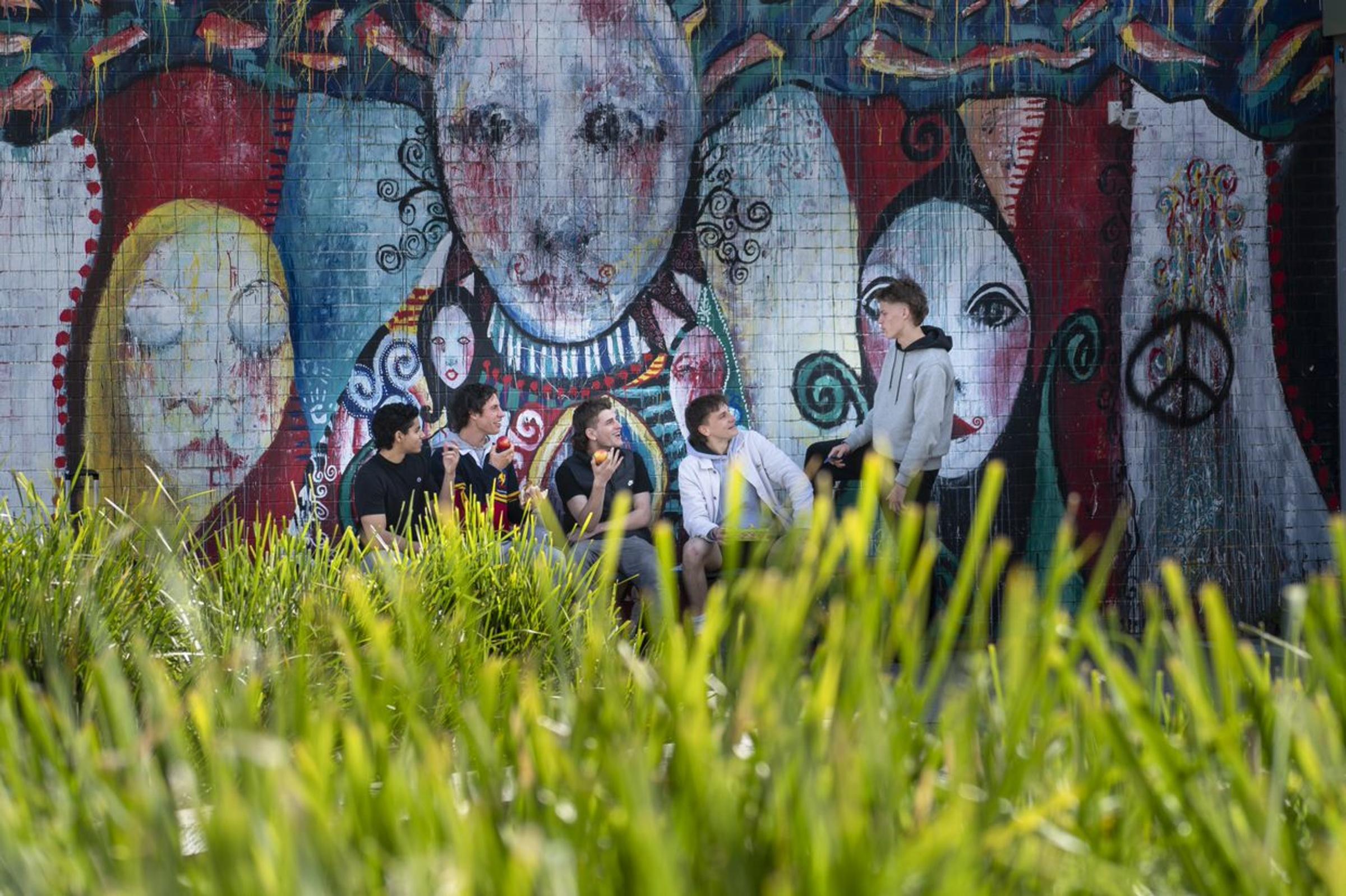Student Welbeing

Supporting Adolescents with School Avoidance: Evidence-Based Tips for Parents
We continue our Term 2 Newsletter segments by providing you with additional resources and suggestions to support your young people with school avoidance behaviour. Recent studies highlight that this behaviour can stem from anxiety, depression, bullying, academic stress, and family issues. To effectively support adolescents dealing with school avoidance, parents can utilise several evidence-based strategies.
1. Open Communication
Creating a safe space for open communication is crucial. Adolescents need to feel heard and understood without judgment. A study published in the Journal of Adolescent Health (2019) emphasizes that adolescents are more likely to express their concerns when they believe their parents are empathetic and supportive.
2. Establish a Routine
Consistency and predictability can reduce anxiety related to school as this creates a feeling of safety. A study in Child Psychiatry & Human Development (2020) found that adolescents with a structured daily routine exhibited lower levels of school avoidance. Ensure your teenager has a set bedtime and morning routine.
3. Address Underlying Issues
Identifying and addressing the root causes of school avoidance is critical. Research in the Journal of Clinical Child & Adolescent Psychology (2021) shows that interventions targeting underlying issues such as anxiety or learning difficulties can significantly reduce school avoidance. We always encourage parents to collaborate with Coordinators and members of the Student Services team.
4. Reintegration Support Plan/Attendance Plan
Gradual reintegration into our school environment can be effective. The Journal of School Psychology (2022) suggests starting with partial attendance and gradually increasing time spent at school. We work towards implementing a stepped approached to re-engagement.
5. Positive Reinforcement
Encouraging attendance through positive reinforcement can motivate adolescents. A study in Behavioural Disorders (2018) found that rewarding school attendance can improve attendance rates. Celebrate small victories to boost your child’s confidence and motivation.
6. Peer Support
Friends play a vital role in adolescents’ lives. Research from the Journal of Youth and Adolescence (2020) highlights the positive impact of peer support groups for students facing school avoidance. Encourage your teenager to connect with supportive friends whether this is online or in person, any type of pf social connection is important.
References – For Interested Parents and Staff
- Bardach, L., Oosterhoff, B., & Kuntz, S. (2019). Parenting behaviours and adolescents' school adjustment: Mediating effects of school connectedness and academic engagement. Journal of Adolescent Health, 65(3), 293-301. https://doi.org/10.1016/j.jadohealth.2019.04.020
- Collins, K., & Ryan, R. (2022). Implementing a gradual return to school protocol for students with school refusal behaviour. Journal of School Psychology, 90, 67-78. https://doi.org/10.1016/j.jsp.2021.12.005
- Fosco, G. M., & Feinberg, M. E. (2020). Positive parent-adolescent relationships and resilience to adolescent school avoidance behaviour. Journal of Youth and Adolescence, 49(8), 1628-1641. https://doi.org/10.1007/s10964-020-01229-6
- Gonzalez, A., & Sellers, C. (2019). The impact of parent engagement on students' school avoidance behavior. Educational Psychology Review, 31(3), 789-814. https://doi.org/10.1007/s10648-019-09494-4
- Kearney, C. A., & Albano, A. M. (2020). When children refuse school: Parent workbook. Child Psychiatry & Human Development, 51(1), 87-99. https://doi.org/10.1007/s10578-019-00933-3
- Sullivan, K., & Villanti, A. C. (2020). Peer influence and adolescent school engagement: The role of peer support groups. Journal of Youth and Adolescence, 49(10), 1985-1998. https://doi.org/10.1007/s10964-020-01256-3
- Thompson, K., & Newton, R. (2018). Enhancing school attendance through positive reinforcement strategies: A review of evidence. Behavioural Disorders, 43(3), 164-176. https://doi.org/10.1177/0198742918776705
Upcoming EHS Events and Student Programs
Term 3, Tuesday July 16 – ‘SafeMinds at Home’ Parent and Carer Seminar
Join us on Tuesday 16 July for an invaluable opportunity at Eltham High School's SafeMinds information forum, in collaboration with iCYMHS - Austin Health, headspace Greensborough, and Nillumbik Youth. This event is tailored for parents and carers like you who are eager to ensure the wellbeing of our young generation. SafeMinds is not just another program; it's a lifeline designed to offer enhanced early intervention mental health support directly within our school community.
With a focus on addressing common yet often overlooked challenges such as anxiety, depression, and self-harm, SafeMinds is one of Eltham High Schools whole school wellbeing approaches. We understand the importance of your involvement in your young person’s school life, which is why SafeMinds prioritises strengthening the connection between parents, carers, and our school community. By attending, you'll gain insights into how you can play an active role in supporting your young person's mental health journey. Moreover, SafeMinds is committed to establishing clear and efficient referral pathways between our school and community youth and mental health services. This ensures that our students receive the timely and appropriate care they deserve, with seamless transitions from school to professional support. For the attending parents and carers, you will have access to a targeted version of SafeMinds Online, empowering you with tools to navigate and support your young person’s wellbeing.
Event Details
Date: Tuesday 16 July
Time: 6:30pm – 7:30pm
Where: Performance Centre, Eltham High School
Audience: Parents and Carers
Registration: Please complete the online registration form:
https://forms.office.com/r/UiLaVVKd0c?origin=lprLink
Key Contact: Madeline Gaitanis, madeline.gaitanis@education.vic.gov.au
Term 3 – Tri Tactics Choices Program for 20 Middle School Students
This year, we've recognised the importance of supporting our male-identifying students as part of the wellbeing efforts we're undertaking through Student Services. Thanks to the School Focused Youth Funding, we've chosen a program tailored to benefit 20 male identifying students in Year 8 and 9.
Program Information:
https://www.tritactics.com.au/choices-emotional-awareness-self-defence.
Objectives:
- Understanding emotions.
- Defusing potential situations.
- Self-awareness, being assertive and confident.
- Learning about options, choices, and consequences.
- Creating respectful relationships.
- Conflict resolution.
- Avoiding potentially difficult situations.
- Prevention & easy steps to identify one’s vulnerability.
- Personal boundaries and limitations.
- Intention, Ability, Opportunity.
If you believe your young person would be interested and benefit from this program, please email their Coordinator and Student Services Leader, Madeline Gaitanis. Please have your EOI sent by June 10.
Key Contact: Madeline Gaitanis, madeline.gaitanis@education.vic.gov.au
MADELINE GAITANIS, Student Services Leader
Student Resources
Variety Grant Rounds | Now Open Year-Round
Variety – the Children’s Charity supports Victorian kids aged 0-17 who are living with illness, disability or experiencing disadvantage through grants, scholarships, programs and events. Applications are now open year-round for Variety Individual and Community Grants. Applications will be reviewed quarterly, the next review will be in July 2024.
Individual Grants
We help children and their families facing challenges by giving them access to resources such as mobility equipment, communication devices, learning aids and technology.
Educational Scholarships
We support children who are experiencing disadvantage with assistance to cover basic educational needs such as textbooks, stationery, uniforms, camps and excursions.
If you have any questions, please feel free to reach out to kidssupport@varietyvic.org.au
ANNA JENKINS, Mental Health Practitioner
